When people think of monogamy, they usually envision species like swans or wolves that mate for life. But did you know that some species of freshwater fish are also believed to form lifelong pair bonds? That’s right! If you’re curious about the fascinating underwater world of romance, this article explores the keyword: what freshwater fish mate for life?
Understanding Fish Monogamy
Before we dive into specific fish species, let’s first understand what monogamy means in the fish world. Unlike birds or mammals, monogamy in fish isn’t as well-defined. Fish don’t typically court their mates for life like swans, but some species do form strong pair bonds that last beyond a single spawning event. These relationships can offer benefits such as shared parental responsibilities and increased survival rates of offspring.
If you’re wondering what freshwater fish mate for life, let’s explore some species that are known for forming these types of long-term relationships.
Freshwater Fish Species Known to Mate for Life
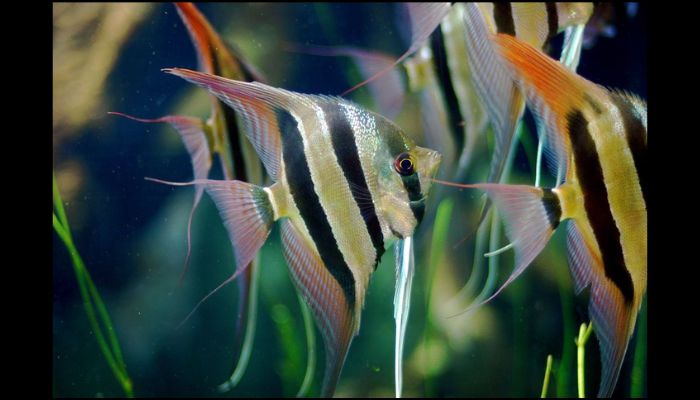
1. Angelfish
Angelfish are one of the most recognized fish species that exhibit lifelong pair bonding. Once they’ve formed a bond, angelfish often stay together for future spawning events. Their pairing usually involves courtship displays where both the male and female fish perform synchronized movements. After choosing a mate, they typically work together to protect their eggs and fend off predators.
- Why Angelfish Are Unique: These fish establish territories, and the bonded pair defends their area from other fish.
- Do Angelfish Mate for Life? While they do exhibit long-term pair bonding, there are instances where angelfish may select new mates, especially if one of the pair dies.
2. Convict Cichlids
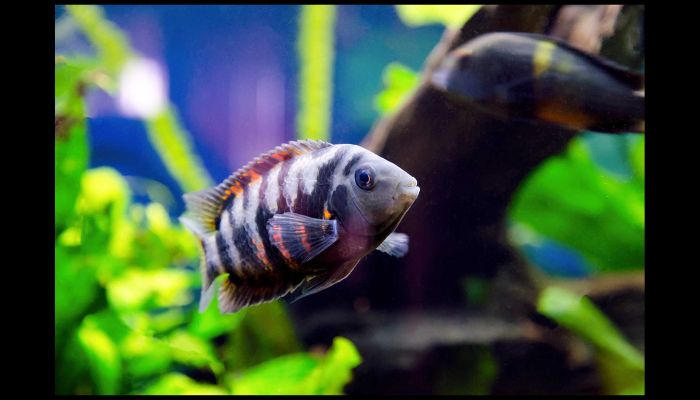
Convict cichlids are another species known to mate for life, forming a monogamous bond that involves teamwork in raising their fry (baby fish). Once they form a bond, both the male and female work together to guard the eggs and their young from predators, showing true dedication to family life.
- Parenting in Convict Cichlids: The bond between convict cichlids is so strong that they divide parental duties equally. The male often guards the territory, while the female looks after the eggs.
- Fun Fact: If you’re keeping convict cichlids in an aquarium, expect to see fierce dedication from both parents.
3. Discus Fish
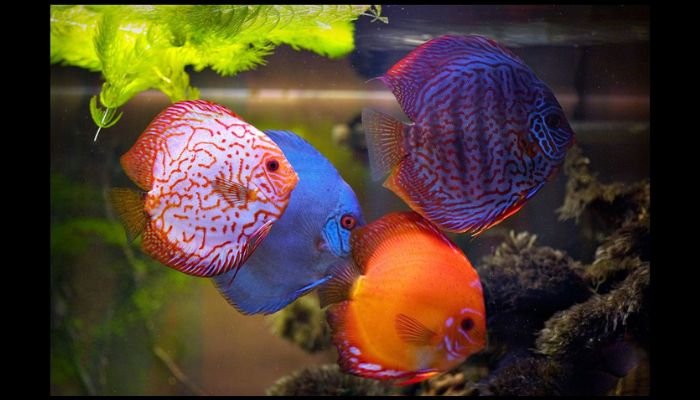
Discus fish are well-known in the aquarium world, not only for their beauty but also for their remarkable pair bonds. Discus fish pair off, and once bonded, they tend to stick together throughout their lives. The bond is strengthened through the care of their offspring.
- Discus Parenting: Both parents secrete a mucus layer from their skin that the fry feed on, which strengthens the bond between parents and their offspring.
- Do They Mate for Life? Yes, discus fish are often noted for forming lifelong pairs, with both partners playing a role in raising the young.
4. Kribensis (Kribs)
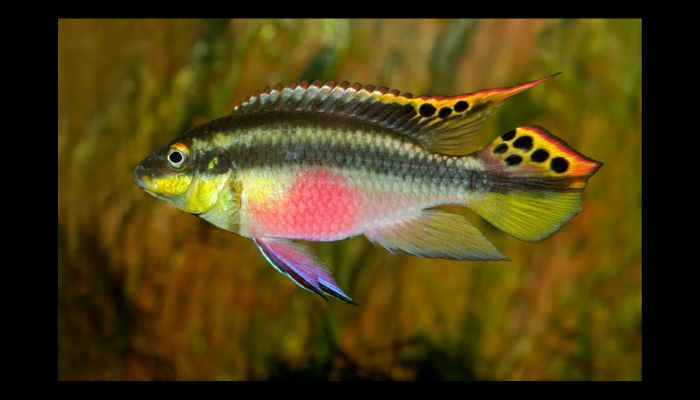
Kribensis are dwarf cichlids that are relatively peaceful compared to other cichlids. These fish are known to form monogamous bonds, where both male and female work closely together to guard their eggs and raise their fry.
- Unique Bonding Behavior: The male and female often display cooperative breeding behaviors, with the female focusing on guarding the fry and the male defending the territory.
- Mate for Life? Yes, once paired, kribensis usually stick with their mate through multiple breeding cycles.
5. German Blue Rams
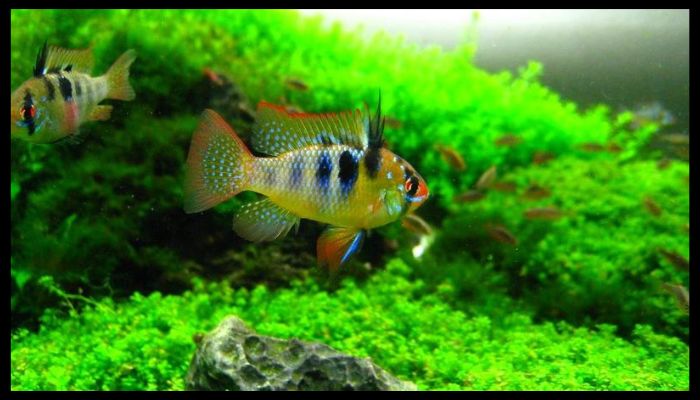
German Blue Rams are another species that exhibit signs of monogamy. Once they choose a mate, these fish work closely with their partners to protect their offspring. They exhibit cooperative parenting and stay together for multiple spawning events.
- Why Rams Are Different: German Blue Rams are highly territorial, and their bonding behavior includes coordinated efforts in protecting their fry and defending their habitat.
- Long-Term Bonding: They do mate for life, although some factors (such as the loss of a mate) can lead them to seek out a new partner.
6. Firemouth Cichlids
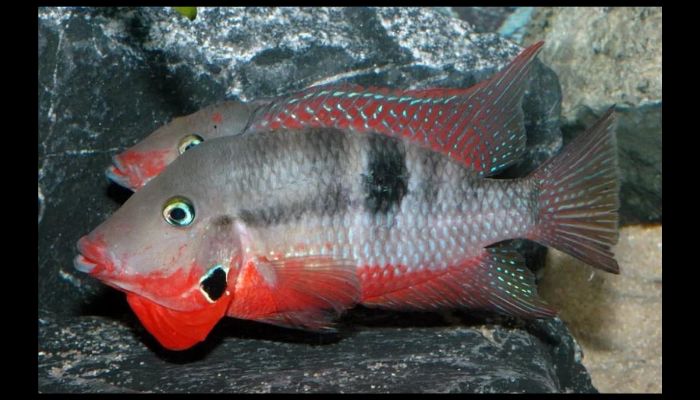
Firemouth cichlids are known to be monogamous, particularly during the breeding season. These fish form strong pair bonds and will defend their eggs and fry fiercely from any intruders. The pair often collaborates in maintaining a breeding site and protecting their territory.
- Teamwork: Male and female Firemouth Cichlids both play active roles in guarding their territory, taking turns watching over the eggs.
- Mating for Life: While they are monogamous for extended periods, like other cichlids, there may be instances where a new mate is chosen.
7. Apistogramma
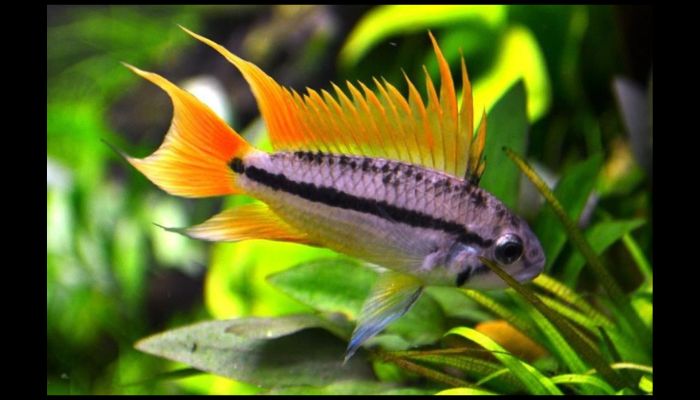
Apistogramma, another dwarf cichlid species, tends to form monogamous bonds when it comes to breeding. These fish are well-known for their vibrant colors and their cooperative parenting. Both parents help raise the young, ensuring that they have the best chance of survival.
- Parenting Style: In some species, the female will focus on guarding the eggs while the male defends the territory.
- Monogamy: Apistogramma exhibit long-term pair bonding during breeding but may select new mates over time.
8. Julidochromis
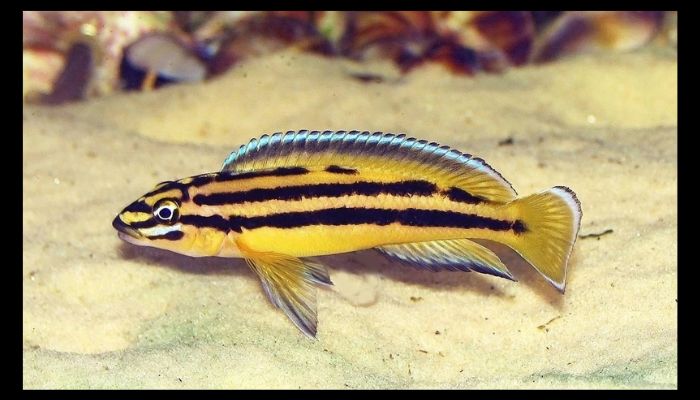
Julidochromis are a small cichlid species from Lake Tanganyika in Africa. They are known for their unique pair-bonding behavior, where both partners are involved in caring for their offspring. In some cases, they may even raise the fry from previous spawning events alongside new eggs.
- Family Dynamics: These fish are highly territorial and protect their young aggressively, with both partners working as a team.
- Lifelong Bonds: Julidochromis are believed to form lifelong bonds, with both partners continuing to mate together for several breeding seasons.
9. Rainbow Kribs
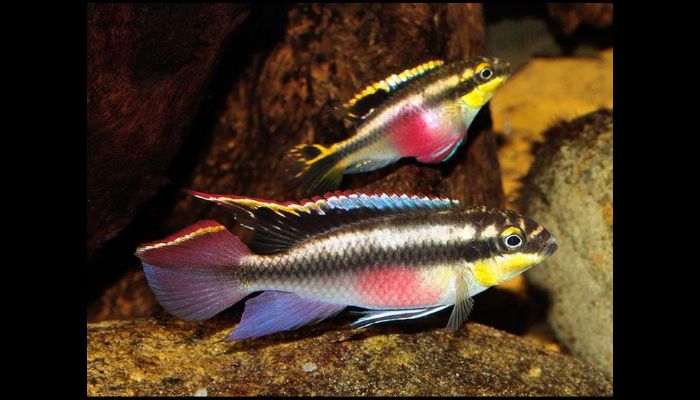
Rainbow Kribs (Pelvicachromis pulcher) are another species of dwarf cichlids known to mate for life. Their mating rituals involve displays of vibrant colors and coordinated swimming. Once they form a pair bond, the fish are dedicated to raising their fry together.
- Do They Mate for Life? Yes, Rainbow Kribs are known for their strong pair bonds and their shared responsibility in protecting their young.
10. Electric Blue Acara
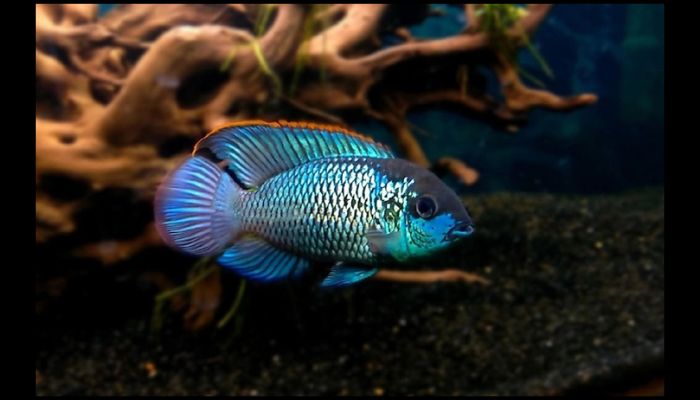
Electric Blue Acara are relatively peaceful cichlids that display monogamous tendencies. Once a pair bond is formed, both the male and female collaborate in raising the fry. They exhibit strong territorial behavior, protecting their eggs and young from other fish.
- Parenting: These fish work as a team, with the male typically guarding the territory and the female caring for the eggs.
- Monogamous Behavior: Electric Blue Acara are known for their long-term pair bonds, making them another example of freshwater fish that mate for life.
Why Do Some Freshwater Fish Mate for Life?
Monogamy in freshwater fish is typically driven by the need to ensure the survival of offspring. Many of these fish live in environments where parental care is essential for the protection and development of eggs and fry. Forming a strong pair bond allows both parents to work together to guard their territory, fend off predators, and ensure that their young are well taken care of.
In species that mate for life, both parents are often equally involved in raising their offspring, which can lead to higher survival rates. Additionally, monogamy helps establish stable territories, which is particularly important for species that rely on specific breeding sites.
Frequently Asked Questions (FAQs)
Q1: Do all fish mate for life? No, most fish species do not mate for life. While some species, especially certain types of cichlids, form long-term pair bonds, the majority of fish only bond for the duration of a single breeding season or even just for one spawning event.
Q2: What is the benefit of monogamy in fish? Monogamy in fish often allows for shared parental duties, which can increase the chances of survival for their offspring. It also helps with territory defense and ensures that both parents are invested in the care of their young.
Q3: Can fish change mates if one dies? Yes, in many cases, if one mate dies, the surviving fish may seek out a new partner for future spawning events.
Q4: Do freshwater fish experience love? While fish don’t experience love in the same way humans do, they do form bonds that are based on cooperative breeding, protection, and shared responsibilities.
Conclusion
So, what freshwater fish mate for life? Species like angelfish, convict cichlids, and discus fish are known to form strong, long-term pair bonds, with both parents playing significant roles in raising their young. These freshwater species exhibit fascinating behaviors that contribute to the survival of their offspring, making them excellent examples of fish that mate for life.
If you’re an aquarium enthusiast looking to observe these bonds firsthand, consider adding some of these monogamous fish to your tank. Just be prepared to give them the space, care, and environment they need to thrive. Happy fishkeeping!